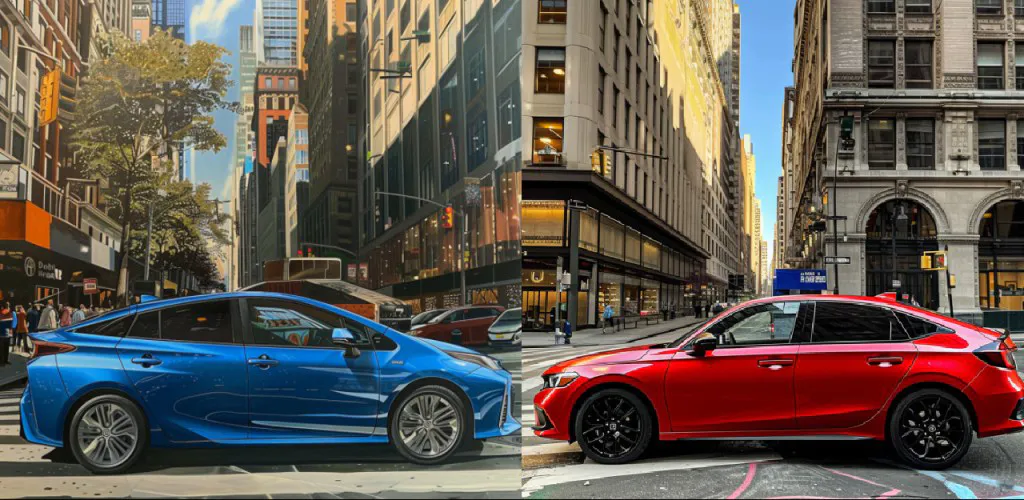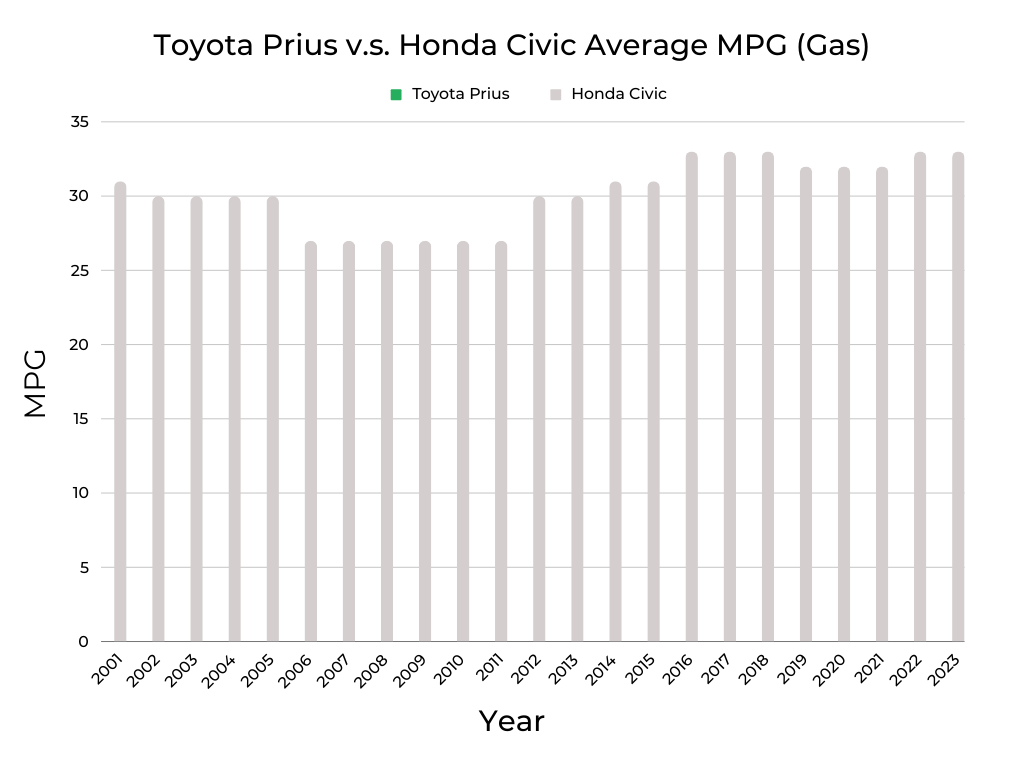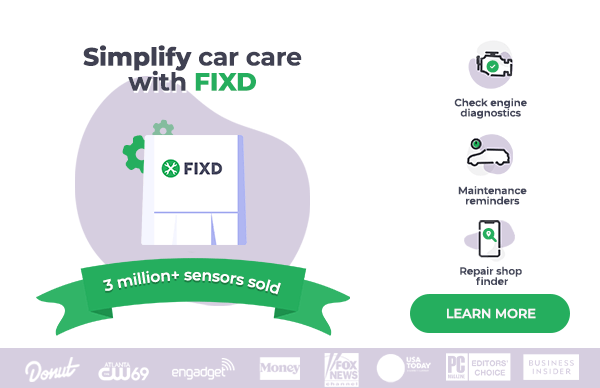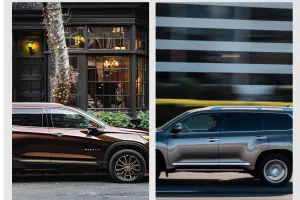The last 100 years of the auto industry are highlighted by iconic vehicles like the Ford Model T and the Volkswagen Beetle, cars that transformed generations. While more recent vehicles are less impactful, some examples are icons in their own way. Two that deserve to be on this list are the Toyota Prius and Honda Civic.
With a U.S. launch in 2001, the Prius has proved hybrid technology could effectively and reliably serve the masses. Mention “Prius,” and even non-car people know it’s a hybrid. The Civic may not be as technologically sophisticated as the Prius (though there were hybrid editions for several years), but it’s the compact car standard that other vehicles are measured against. Over its 50-year history, the Civic has developed a loyal following that’s the envy of many automakers.
Comparing the Toyota Prius and Honda Civic is natural as they offer efficient transportation that won’t break the bank. Stellar fuel economy is the Prius’ claim to fame, but most model years offer hatchback versatility, and newer examples are available with all-wheel drive.
Meanwhile, the Civic is that trusty friend that’s there when you need them. It doesn’t scream for attention or get in the way. Honda has also employed a something-for-everyone approach by offering the Civic in many forms. Buyers can choose from a sedan or hatchback (Honda sold a Civic coupe through 2020) and performance variants (the Si and Type R).
I’ve been around Hondas for decades and spent time in a Prius as both driver and passenger. After reviewing all the data, I concluded that I’d have a hard time deciding between the Prius and Civic. The Prius gets points for fuel economy and longevity, while the Civic delivers a lot of bang for the buck. You’ll want to keep reading to learn what separates these cars and identify your priorities.
A dive into the details shows that the Prius and the Civic, like all idols, aren’t perfect. There’s spotty engine reliability to be concerned with, especially among older years. In addition, strong resale values make newer examples expensive. Overall, maintenance and repair costs are reasonable, but some Prius and Civic years are worse than others. There’s a lot to consider.
Looking for the latest model? Explore: Toyota Prius Vs. Honda Civic | 2023 Comparison.
Keep reading to see how this Toyota Prius and Honda Civic contest turns out. Other match-ups to review include Outback vs. Forester, RAV4 vs. CR-V, Civic vs. Corolla, Pilot vs. Highlander, and Odyssey vs. Sienna.
| Income Bracket | Monthly Financing Cost Range | Cash Purchase Price Range | Toyota Prius Years | Honda Civic Years | Best Model Year: | Why? |
| $5k-$10k | $83-$125 | $3,000-$4,500 | 2005 | 2006 | 2006 Civic | Strong safety score, reasonable engine reliability, and modest market value |
| $10k-$15k | $125-$187 | $4,500-$6,750 | 2008 | 2010 | 2010 Civic | Above-average engine reliability, excellent safety score |
| $15k-$25k | $187-$312 | $6,750-$11,250 | 2014 | 2013 | 2014 Prius | Above-average engine reliability, solid safety score, and good value |
| $25k-$35k | $312-$437 | $11,250-$15,750 | 2016 | 2018 | 2018 Civic | Very good engine reliability, perfect safety score, and solid value |
| $35k-$50k | $437-$625 | $15,750-$22,500 | 2021 | 2021 | 2021 Prius | Amazing fuel economy, excellent safety score |
See the methodology for the table above.
Before you respond to the “For Sale” ad, check out this How to Buy a Used Car article for a step-by-step checklist.
Price History Comparison | Toyota Prius vs. Honda Civic
Average Market Value – Based on Owners’ Self-Reported Mileages | Toyota Prius vs. Honda Civic
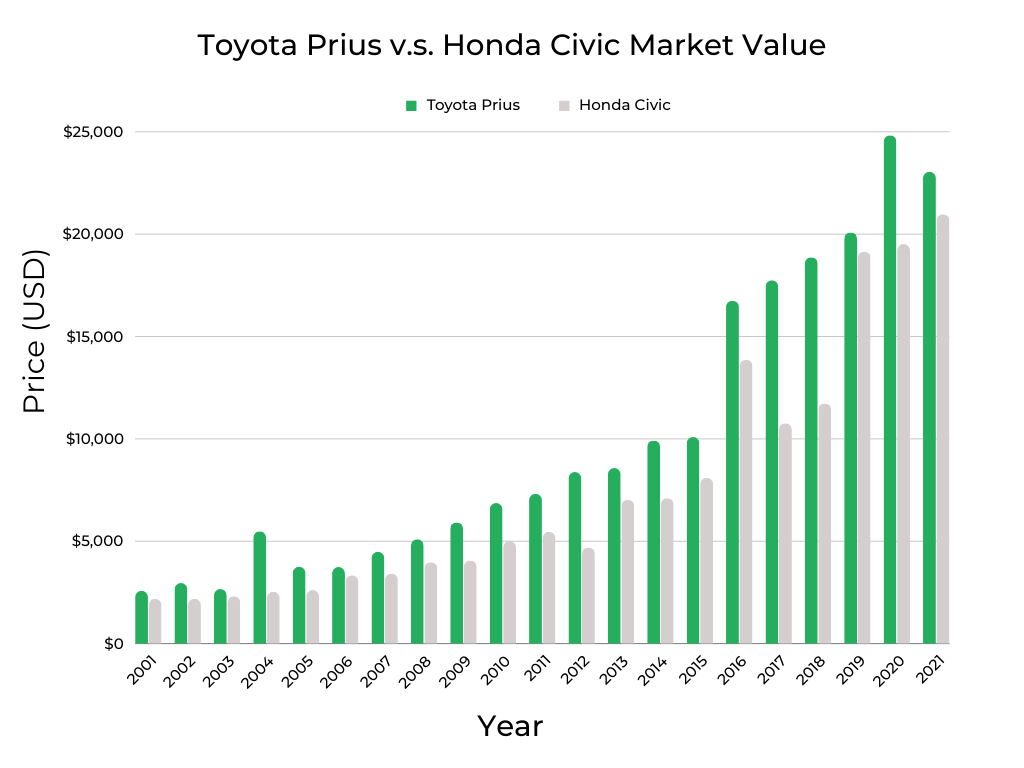
Shopping for a used car often starts with a look at prices. This graph reflects the average Kelley Blue Book (KBB) market values for the Prius and Civic from 2001-2021 and incorporates mileage provided from FIXD owner surveys. In addition, these numbers are for private-party sales, so a purchase at a dealer will usually be 33%-50% higher. If retail prices are a stretch, look for an older model year or a car with higher mileage.
A glance at Prius (green) and Civic (gray) resale values might lead to an assumption that these Toyotas have lower depreciation. However, we have to look at the original selling prices to get a true explanation for the price gaps.
In truth, the Prius had a higher MSRP than the Civic. For example, the starting price for a 2008 Honda Civic LX was $17,595, while a 2008 Toyota Prius Standard came with $23,899 on the window sticker, according to KBB. That’s a 25% difference.
In general, Toyotas and Hondas hold their value well, but a higher MSRP usually means a higher selling price on the used car market. Compared to the Civic, second-hand Prii (“Prii” is plural for Prius, according to Toyota) cost more simply because they were more expensive when new. In other words, given similar factors like mileage, age, and condition, a pre-owned Civic impacts the budget less than an equivalent Prius. Be sure to read our Best and Worst Years series of articles highlighting the Toyota Prius and Honda Civic winners and losers.
Depreciation vs. Maintenance Expenses
Depreciation is an unavoidable consequence of buying a mainstream automobile (a car that isn’t rare or has collector value). As mentioned, Toyotas and Hondas are less susceptible to these effects but are not entirely immune. The Prius and the Civic will lose value over time, just not as steep or as soon as other brands.
Shoppers can still take advantage of depreciation by looking for an older Prius or Civic, a vehicle that’s already suffered the most significant drop in resale value. Generally, this occurs after 10-15 years, depending on the model. Yet, buying just any older vehicle isn’t the correct approach.
You also need to consider cars with a history of reasonable repair and maintenance costs. Bringing these two elements (depreciation and upkeep expenses) together creates “sweet spot” buying opportunities highlighted by the black-outlined boxes in the above charts.
The Prius and Civic have overlapping target windows: the 2002-2011 model years. These are the cars to focus on to maximize your money. Later, I’ll explore maintenance and repair costs for the Prius and Civic so you can get a complete picture of these sweet spots.
But don’t assume every example within these ranges is a smart buy. Learn more by reviewing the best and worst years of the Toyota Prius and Honda Civic. There’s also an at–a–glance summary towards the end of this article.
Reliability Comparison | Toyota Prius vs. Honda Civic
Two ratings are at the core of our look at the Toyota Prius and Honda Civic.
- The FIXD Reliability Score measures the number of check engine lights recorded for a particular model year by installed FIXD sensors. Think of it as an engine reliability score. While every check engine light doesn’t directly translate into reliability concerns (such as a dead battery or loose gas cap), these indicators still provide insight into a car’s dependability. This data is weighted by mileage.
- The second rating is the Owner Reliability Score. This is a subjective ranking of how surveyed owners feel about their respective vehicle’s dependability. Each owner estimates how capable their car is for trips of different lengths. A vehicle that can handle a cross-country adventure receives the highest score, while a car only suitable for a quick point A to point B trip gets the lowest score.
Both rankings are based on 1 being the lowest, 10 being the highest, and 5 being the average score.
We’ll also point out that both scores seldom align. The FIXD Reliability Score is determined by a definitive number, the frequency of check engine lights. On the other hand, the Owner Reliability Score is opinion-based. Owners tend to have pride in their automobiles, with higher ratings as a result. At a minimum, those with older vehicles are more accepting of check engine lights. For many, it’s the price of owning an aging car.
Seeing low engine reliability scores from the early years of the 21st century is unsurprising. After all, these are vehicles with two decades of use. No matter a vehicle’s quality when it leaves the factory, time will take its toll.
However, you’ll notice that the FIXD Reliability Scores approach average (5 out of 10) starting with the 2006 editions. At this point, the Civic enjoys consistently better engine reliability over the Prius through 2015. The Prius doesn’t reach par (or better) with the Civic until 2016.
Of course, a check engine light (CEL) isn’t always a sign of an expensive repair shop bill in your future. Sometimes, all it takes is a loose gas cap or a dying car battery to trigger a CEL.
A look at Owner Reliability Scores says one thing: the Toyota Prius is well-loved by its owners regardless of check engine light frequency. This is especially evident with 2004 and older Prius models, examples with below-average engine reliability. I find it quite revealing that of the 21 model years surveyed, Prius owners favor their cars over their Civic counterparts for 17 of these years. Civic owners appear to take a more realistic view of their cars.
Review the Best and Worst Years articles on the Toyota Prius and Honda Civic to learn more about these vehicles’ FIXD Reliability and Owner Reliability Scores.
Longevity Comparison | Toyota Prius vs. Honda Civic

As I’ve noted in other Civic comparison articles (for example, Toyota Prius vs. Honda Civic | The Best Model Year For Every Budget), I’m surprised not to see any older surveyed Civics crack or at least approach the 200,000-mile mark. It’s an achievement for which Toyota appears better suited. In particular, the 2005 and 2006 Prius have cracked this barrier, with other model years on the horizon for this accomplishment.
In 2022, Consumer Reports proclaimed that hybrid cars offered excellent reliability (along with other benefits), and FIXD survey data validates that at least longevity is part of the equation. Even back in 2011, Consumer Reports said that a Prius should have no trouble reaching 200,000 miles.
Let’s look at lifespan differently by reviewing for-sale listings from autotrader.com (December 27, 2023) to check for examples of high mileage in the marketplace. This unscientific analysis reveals 1,637 Prii and 2,388 Civics from the 2001-2012 model years. I selected older years because these vehicles are more likely to have higher mileage.
The listing uncovers 181 Prii (11%) with at least 200,000 miles against 180 Civics (7.5%) with the same mileage specs. The results tell me that while a Civic can achieve high-mileage status, the Prius is more likely to do so.
Review the individual articles on the best and worst years of the Toyota Prius and Honda Civic for a more thorough look at longevity.
Who Should Buy These Cars: The Legacy of Toyota Prius vs. Honda Civic
According to FIXD surveys, Prius and Civic owners have two principal uses for their cars: family transportation and “lots of driving” (road trips and long commutes). In particular, half of those with a Prius in the driveway focus on family hauling, while six out of ten Civic owners are behind the wheel mainly to get back and forth to work and for long-distance driving.
Given these cars are tasked with daily driver duties, very few owners rely on their Prii and Civics for other tasks like sporty or luxurious driving. The compact nature of these cars also doesn’t make them well suited for hauling or use as an office on wheels.
| Frequent Use Categories: | Toyota Prius | How Useful? (Out of 5 Stars) | Honda Civic | How Useful? (Out of 5 Stars) |
| Family Vehicle | ***** | **** |
| Lots of Driving (travel/long commute) | **** | ***** |
| Hauling/Towing | * | * |
| Office on Wheels | * | * |
| Sport/Fast Driving | * | * |
| Luxurious Driving | * | * |
| Outdoor/Off-Road | * | * |
Driver Experience | A Summary of The Top 10 Toyota Prius vs. Honda Civic Reddit Posts:
Numerous Reddit posts compare the Toyota Prius and Honda Civic. Here are highlights of some of the conversations from Reddit: r/whatcarshouldIbuy.
When it comes to choosing between a Toyota Prius and a Honda Civic, some clear differences are discussed. Many Reddit posts debate the fuel efficiency benefits of the Prius’ hybrid drivetrain over the traditional gas engine in the Civic. One Redditor remarked, “The Prius will easily get 50+ mpg combined driving while a Civic will top out around 40 mpg.” Some argue the improved gas mileage is worth the higher upfront cost for the Prius, with one commenter saying, “The premium you pay for the Prius will pay itself back in fuel savings eventually.”
However, others make the case that the Civic is more fun to drive and has a better interior. One post states, “The Civic will probably be more enjoyable to drive daily,” and another says, “The Civic has a way nicer interior IMO.” Some argue that the Prius’s tech is outdated, with a comment saying, “The Prius seems to be a bit outdated technology wise vs the Civic.” When it comes to cargo capacity, though, the Prius gets favor with its hatchback style: “The Prius has much better practicality than the Civic sedan.”
The Prius is praised for efficiency, but the Civic gets points for driving dynamics and more modern tech and styling. One comment sums up these feelings: “The Prius is an appliance that sips gas while the Civic is a little more livable and fun.”
Best & Worst Years | Toyota Prius vs. Honda Civic | 2001-2024

Options are limited for Prius and Civic buyers on a tight budget. But at least the 2004-2006 Prius and 2006 Civic get a green light. These won’t be perfect cars (few vehicles with two decades of use seldom are), yet these examples are good starting points.
With more to spend, you can look for a 2008-2009 or 2011 Prius or a 2010 Civic. Shoppers will appreciate the greater selection with the Prius because more model years are worthy of a thumbs up. Just remember that a Prius usually costs more than an equivalent Civic. Choices expand considerably (especially for the Civic) once the 2013 and newer model years make the shopping list. Just stay away from the 2017-2018 Prius.
We’ll call attention to the undecided years (yellow) only because there isn’t enough information to give these editions a thumbs up or down.
Important Features Timeline | Toyota Prius vs. Honda Civic
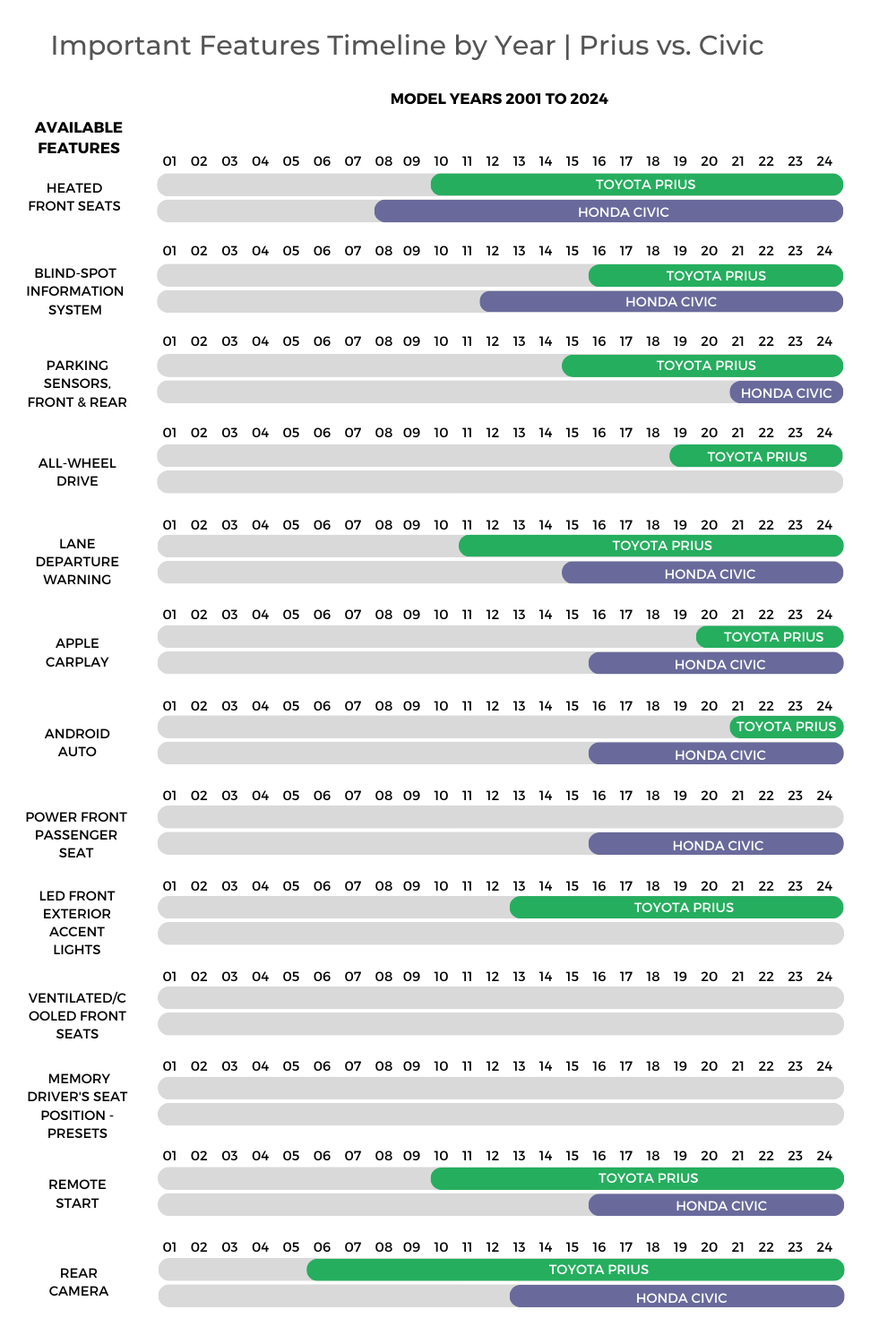
Neither the Prius nor the Civic can claim a trophy for consistently introducing a new technology or feature. Equipment rollout is quite hit or miss. These cars are lower in the respective manufacturer’s model range, so the availability of comfort and convenience equipment may not be a priority.
However, Honda can lay claim to offering Apple CarPlay and Android Auto in the Civic several years before Toyota included this technology in the Prius. The Civic was also available with heated front seats ahead of the Prius.
At the same time, the Prius has first-to-offer bragging rights for several conveniences like front and rear parking sensors, remote start, and a rearview camera. Newer Prius models are also available with all-wheel drive, something that’s never been part of the Civic’s equipment list.
Maintenance Costs (Year-by-Year Average) | Toyota Prius vs. Honda Civic
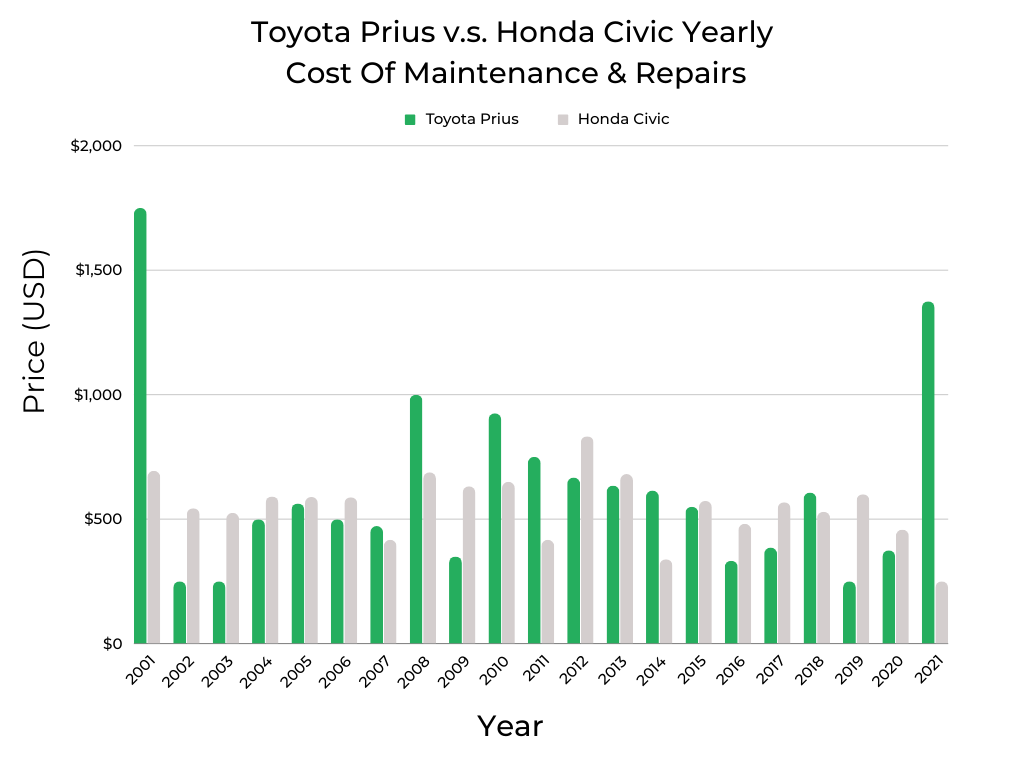
FIXD surveys show that the average Prius owner spent $624 for maintenance and repairs in 2022. That’s about 12% more than the $555 paid by Civic owners. Neither figure appears outrageous, but some specific model years are worth being aware of.
Upkeep for the 2001, 2008, 2010, 2011, and 2021 Prii is at least 20% higher than average, with the $1,750 spent on the 2001 model year being especially notable (not in a good way). The Civic has its share of higher maintenance and repair expenses, with the 2001, 2008, 2012, and 2013 model years costing at least 20% more than average.
Seeing these above-average repair bills makes sense because older cars require more shop time. Parts just wear out, and the longer a vehicle is on the road, the greater the likelihood of it needing repairs. The maintenance tab will also rise.
Keep this in mind because the great deal you might have gotten on an aging Prius or Civic can quickly turn sour because of upkeep costs.
Review the best and worst years of the Toyota Prius and Honda Civic to learn more about maintenance and repair costs for these vehicles.
Safety Rating Comparison | Toyota Prius vs. Honda Civic
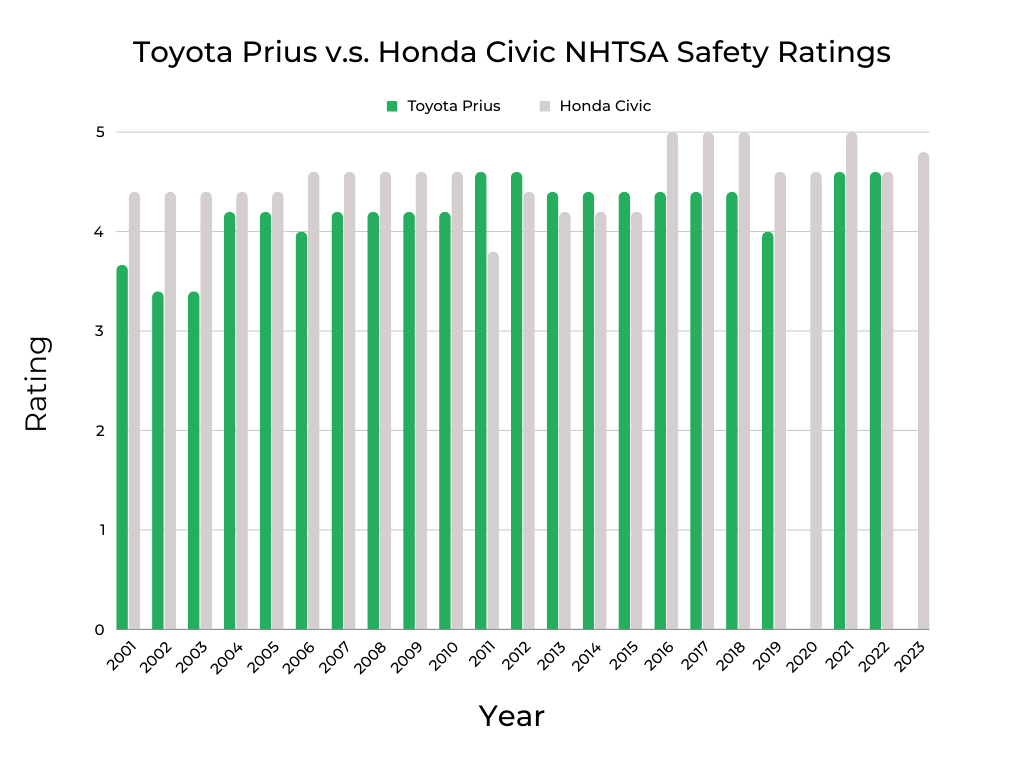
Safety has been part of the car-buying conversation for more than 50 years. However, this subject has become more prominent thanks to entities researching safety and publishing the test results. One example is the National Highway Traffic Safety Administration (NHTSA).
The last thing Toyota, Honda, or any automaker wants is a poor safety showing, with the results readily available online. This is especially a concern when a competing vehicle displays better safety testing scores. As a matter of fact, it’s rare to see a car from the last decade score below a 4 (out of 5) in NHTSA testing, what I consider the minimum threshold for a “safe” car. You’re more likely to see results in the 4.2-4.6 range, with the occasional vehicle scoring a perfect 5.
Even from as far back as 2001, the Honda Civic has done well in government crash tests (I’ll explain shortly what happened in 2011). When it comes to crash test safety and a 21st-century Civic, there’s nothing to worry about.
On the other hand, the Prius has a somewhat more inconsistent NHTSA record. Older examples (2001-2003) fall to reach the minimum safety bar (4 out of 5). There are also two model years (2006 and 2019) that just make this crucial benchmark. Except for these outlier years, the Prius also gets solid safety scores.
Test scores for the 2011 Civic dropped due to more rigorous NHTSA testing standards. Honda knew about this change years in advance but opted not to make any engineering changes for that model year. Instead, the company put its engineering efforts into the all-new 2012 Civic.
More details about crash test safety scores are covered in articles about the Toyota Prius and Honda Civic.
Fuel Efficiency Comparison | Toyota Prius vs. Honda Civic
Since the Toyota Prius has always been a hybrid, it doesn’t make the “gas” mpg chart. The Civic’s fuel economy rating of 30 mpg (give or take a few mpgs, depending on the year) is right on target for a non-hybrid vehicle in this class. This isn’t necessarily bad or good, just what’s expected.
For the years that Honda offered a Civic Hybrid, fuel efficiency improved noticeably—these Hondas offered 40 mpg or better. However, Civic Hybrid fuel economy takes a back seat to the Prius during competitive years. The Prius’ 45+ mpg is exceptional, and by 2016, this Toyota crossed into holy grail territory with a 50 mpg or better rating.
Methodology
- Compare two vehicles, the Toyota Prius and the Honda Civic and provide a comprehensive analysis.
- Gather relevant information and data on both vehicles from reliable sources, such as manufacturer specifications, expert reviews, customer feedback, industry reports, and data sources like manufacturer websites, FIXD App, Kelley Blue Book, FuelEconomy.gov, and NHTSA.
- Collect data on various aspects, including performance, safety features, fuel efficiency, maintenance costs, reliability, owner satisfaction, and market value.
- Identify the key criteria that will be used to evaluate and compare the two vehicles.
- Ensure the criteria cover both objective factors (such as performance metrics, safety ratings, and fuel efficiency) and subjective factors (such as owner satisfaction, comfort, and features).
- Assess the performance of both vehicles based on factors such as acceleration, handling, braking, and overall driving experience.
- Compare engine options, horsepower, torque, transmission options, and any unique performance features.
- Examine the safety features and ratings of both vehicles.
- Evaluate crash test ratings, advanced driver assistance systems (ADAS), active and passive safety features, and any notable recalls or known issues related to safety.
- Consider both NHTSA safety ratings and IIHS awards for a comprehensive safety assessment.
- Analyze the fuel economy of both vehicles based on EPA mileage estimates.
- Compare their MPG ratings, average full-tank range, and any significant differences in fuel efficiency.
- Assess the average annual maintenance and repair costs for both vehicles.
- Consider data from surveyed owners and other reliable sources, such as FIXD App owner surveys, to determine the overall cost of ownership over time.
- Evaluate the reliability of both vehicles based on owner reports, FIXD App data, and any known issues or recalls.
- Consider factors such as engine reliability, common problems by model year, long-term durability, and owner reliability scores gathered from surveys.
- Consider owner satisfaction by gathering information from forums, online communities (Reddit: r/whatcarshouldIbuy), customer reviews, and owner reliability scores.
- Summarize key factors that owners appreciate and any common complaints or drawbacks mentioned by owners.
- Compare the features and technologies offered by both vehicles.
- Highlight any notable differences in terms of infotainment systems, connectivity options, driver assistance features, interior quality, and available upgrades.
- Assess the market value and depreciation of both vehicles.
- Compare average prices, resale value, and how the vehicles hold their value over time.
- Consider average private-seller valuations from Kelley Blue Book (KBB) for a comprehensive assessment.
- Summarize the findings of the comparison, highlighting the positives and negatives of each vehicle.
- Provide a fair and balanced recommendation based on the comparison, considering factors such as budget, personal preferences, specific needs of the buyer, and the comprehensive analysis conducted.
Sources:
-
- KBB Values: Average private-seller valuations as supplied by Kelley Blue Book (KBB), based on a Toyota Prius and Honda Civic with typical mileage for that respective model year.
-
- Fuel Economy: Mileage-per-gallon estimates according to the EPA MPG on Fueleconomy.gov.
-
- Annual Maintenance/Repairs: Upkeep expenses as reported by surveyed Toyota Prius and Honda Civic owners.

Dave Goldberg is an automotive journalist and lifelong car fanatic. He writes for numerous enthusiast and business outlets and is an ongoing contributor to HotCars.com, one of the most popular car culture websites. When he’s not writing or driving, Dave is either under a hood or asleep. His credentials include a BA in Journalism from The George Washington University.

